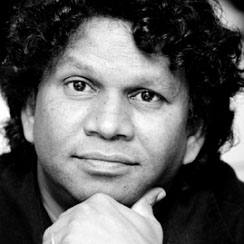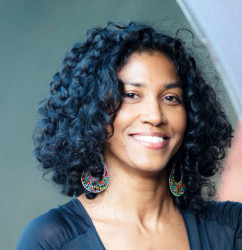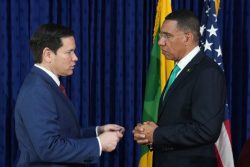The Guyana Prize for Literature reveals an interesting mix of some of the leading writers and previous winners and a wave of very new writers among the contenders, according to the shortlist recently released. This suggests the continuing importance of the prize on two levels: one – that it attracts the established authors who continue to find it, and literary prizes in general, important and worth contesting; two – that the prize has developmental functions: it still contributes to the advancement of the literature since it heralds the passage of new works by the foremost writers into Guyanese and West Indian literature in addition to the introduction of new and up-coming artists.
For the Best Book of Fiction in the Guyana Prize there are three contenders who are all established Guyanese novelists – (alphabetically) 1. David Dabydeen, Johnson’s Dictionary (Peepal Tree); 2. Oonya Kempadoo, All Decent Animals (Farrar, Strous, Giroux); 3. Jan Lowe Shinebourne, The Last Ship (Peepal Tree).
 The newest of them, Kempadoo, is already highly recognised and acclaimed. All Decent Animals is her third novel and she had already made a telling impression with her first – Buxton Spice. The longest standing among them is Shinebourne who rose to prominence when she won the first Guyana Prize for a First Book of Fiction in 1987 with Timepiece. She was shortlisted in 2010 with Chinese Women. Dabydeen is among the foremost writers in the UK and is a multiple winner of the Guyana Prize. Interestingly, his career in fiction started with the Guyana Prize, when he won the major overall prize with his first novel The Intended in 1992. So it is evident that the growth and advancement of so many of these writers have been carried along with the prize over many years.
The newest of them, Kempadoo, is already highly recognised and acclaimed. All Decent Animals is her third novel and she had already made a telling impression with her first – Buxton Spice. The longest standing among them is Shinebourne who rose to prominence when she won the first Guyana Prize for a First Book of Fiction in 1987 with Timepiece. She was shortlisted in 2010 with Chinese Women. Dabydeen is among the foremost writers in the UK and is a multiple winner of the Guyana Prize. Interestingly, his career in fiction started with the Guyana Prize, when he won the major overall prize with his first novel The Intended in 1992. So it is evident that the growth and advancement of so many of these writers have been carried along with the prize over many years.
The Best Book of Poetry reflects a similar state of affairs. All three nominated poets are established Guyanese writers. 1. Cyril Dabydeen, God’s Spider (Peepal Tree); 2. Maggie Harris, 60 Years of Loving (Cane Arrow Press); 3. Sasenarine Persaud, Love in The Time of Technology (Tsar).

Persaud is a leading Guyanese writer with a long and very prolific career in both Canada and Florida, USA. He has been shortlisted a number of times and has many publications in both poetry and fiction, since he is also a novelist. These include the novel Dark Swirl, among his early work, and In A Boston Night, one of his most recent collections of poetry (2012).
Harris, who lives in the UK, won the Best First Book of Poetry with her first collection Limbolands and was shortlisted for her second. So that she is one whose career got started with the Guyana Prize which is keeping pace with her development. Harris is one of two former winners in the line-up. The other is Cyril Dabydeen who was a winner in the fiction category in 2006. Before that he was shortlisted several times in both Poetry and Fiction since 1989, so that the prize has been a part of his development.
There are only two nominated for the Best Book of Drama. (alphabetically) 1. Harold Bascom, Desperate for Relevance: A Surreal Drama of Dead Caribbean Writers Bound in a Curious Hereafter; 2. Milton Bruce, New York New York.
Here is an interesting mix of experience and newness. While both Bascom and Bruce are veteran writers, Bruce, in a way, is new to the Guyana Prize. It is not the first time he has entered with his work, and he has written a number of pieces, but he is now shortlisted for the first time with a new play about Guyanese immigrants in New York. On the other hand, Bascom was among the first list of writers shortlisted for the Guyana Prize in 1987. At that time there was no prize for drama. Bascom was on the Fiction shortlist for his own first novel Apata, published by Heinemann in 1986. But he is primarily a dramatist and since then he has won the Guyana Prize for Drama on multiple occasions between 1994 with Two Wrongs and 2010 with Blank Document. Among the plays, therefore, is that mixture of establishment and a playwright being highlighted for the first time.
Then there are the first books in which almost entirely new writers are coming to the fore: Best First Book of Fiction. 1. Rueben Latchmansingh, A Dip at The Sangam (Westbow Press); 2. Keisha McCammon, Dancehall Lyrics; 3. Subraj Singh, Rebelle and Other Stories.

All three are new. However, Latchmansingh is the only one with a published book, as his A Dip At The Sangam was released by Westbow. It is a new addition to Guyanese literature, made more so because it is available in print. The other two are unpublished manuscripts. McCammon is now entering a new world of writing since she already has a career as a journalist. Her apprenticeship gets quite a boost with this nomination for the Guyana Prize which explores the new popular sub-culture in Guyana. Subraj is the newest of the nominees, although he has already produced a considerable volume of work. As a student at the University of Guyana he won the Walter Rodney Literary Prize in 2014 for a short story. Since then, having studied drama as a part of his programme at UG, he has gone on to be a prolific playwright during his studies at the National School of theatre Arts and Drama. This unpublished manuscript – Rebelle and Other Stories now propels him further into the world of fiction writing.
The shortlist for the Best First Book of Poetry is: 1. Cedric Castello, Rasta Lyrics; (Caribbean Press); 2. Stanley Niamatali, The Hinterlands (Caribbean Press).
Both are entirely new poets who took the opportunity to submit their work to the Caribbean Press and merited publication. That opportunity offered to many unheralded and debutante writers in Guyana has thus already seen some kind of returns as these first time writers are now exposed to a wider audience, with each standing a chance of winning a major literary prize. In this way both the Caribbean Press and the Guyana Prize will be realising some of their developmental goals.
The Caribbean Prize was established in 2010 and, unlike the Guyana Prize, admits only published books. The writers who feature in it are therefore more likely to have achieved some level of establishment. Yet, even there a certain mix of the academy and the newly emerging may be found. The net is cast further afield than is the case with the Guyana Prize since the Caribbean Prize is open to writers from anywhere in the region.

Best Book of Fiction: 1. David Dabydeen, (Guyana) Johnson’s Dictionary
- Barbara Jenkins (Trinidad & Tobago) Sic Transit Wagon
- Sharon Leach (Jamaica) Love it when you come, hate it when you go
- Ingrid Persaud (Trinidad & Tobago) If I never went Home (Blue China Press)
- Elizabeth Walcott-Hackshaw (Trinidad & Tobago) Mrs B
Best Book of Poetry: 1. John Agard (Guyana/UK) Travel Light Travel Dark (BloodAxe Books)
- Edward Baugh (Jamaica) Black Sand (Peepal Tree)
- Vladimir Lucien (St Lucia) Sounding Ground
- Jennifer Rahim (Trinidad & Tobago) Ground Level
- Tanya Shirley (Jamaica) The Merchant of Feathers
Best Book of Drama: 1. Harold A Bascom (Guyana), Desperate for Relevance: A Surreal Drama of Dead Caribbean Writers In A Curious Hereafter.
- David Edgecombe (Montserrat), Lady of Parham.
That mixture is most noticeable in the fiction where Dabydeen represents the experienced establishment as against others somewhat less established. Persaud is presenting her first book of fiction. Of minor interest is that Walcott-Hackshaw is the daughter of Nobel Prize Winner Derek Walcott.
Foremost West Indian poets Baugh and Agard are contending for the poetry prize against the experienced Rahim. Shirley and Lucien are somewhat newer voices, although Lucien is already a prize-winner, having been awarded the Bocas Prize earlier this year.
Both Bascom and Edgecombe are well established in their field, with the latter having published several plays including a book of drama Heaven and Other Plays and the very popular Sunofabitch.








